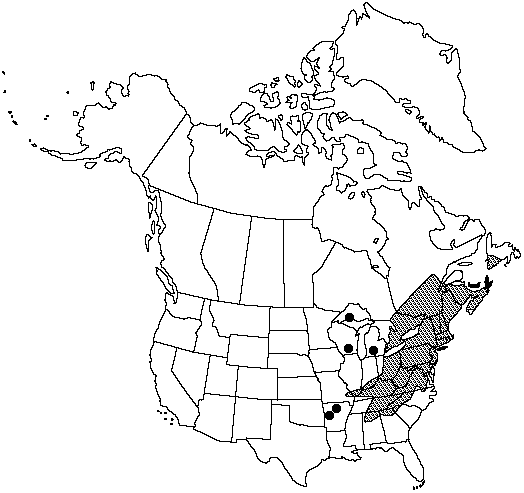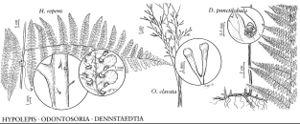Difference between revisions of "Dennstaedtia punctilobula"
Index Fil. 97. 1857.
FNA>Volume Importer |
imported>Volume Importer |
||
| (7 intermediate revisions by 2 users not shown) | |||
| Line 8: | Line 8: | ||
}} | }} | ||
|common_names=Hay-scented fern;dennstaedtie à lobules ponctués | |common_names=Hay-scented fern;dennstaedtie à lobules ponctués | ||
| − | |basionyms={{Treatment/ID/ | + | |special_status={{Treatment/ID/Special_status |
| + | |code=F | ||
| + | |label=Illustrated | ||
| + | }}{{Treatment/ID/Special_status | ||
| + | |code=E | ||
| + | |label=Endemic | ||
| + | }} | ||
| + | |basionyms={{Treatment/ID/Basionym | ||
|name=Nephrodium punctilobulum | |name=Nephrodium punctilobulum | ||
|authority=Michaux | |authority=Michaux | ||
| + | |rank=species | ||
| + | |publication_title=Fl. Bor.-Amer. | ||
| + | |publication_place=2: 268. 1803 | ||
}} | }} | ||
|synonyms= | |synonyms= | ||
| Line 20: | Line 30: | ||
}}<!-- | }}<!-- | ||
| − | --><span class="statement" id="st- | + | --><span class="statement" id="st-undefined" data-properties=""><b>Stems </b>long-creeping, 2–3 mm diam. <b>Leaves</b> clustered, erect, 0.4–1(–1.3) × 0.1–0.3 m. <b>Petiole</b> straw-colored to brown, darker at base, dull, ca. 1/2 length of blade, pubescent with soft, jointed hairs. <b>Blade</b> yellow-green or pale green, dull, lanceolate, 2-pinnate-pinnatifid, ca. 3 times as long as wide, base slightly narrowed but truncate, apex acuminate, with soft, silver-gray, jointed hairs on both surfaces. <b>Basal</b> segments of pinnules opposite; ultimate segments ovate to lanceolate, base equilateral, truncate, margins deeply lobed, serrate-crenate. <b>Sori</b> globose to almost cylindric; indusia tubular to cylindric. <b>Spores</b> trilete, globose with low, tuberculate, distal face and equatorial flange. <b>2n</b> = 68.</span><!-- |
-->{{Treatment/Body | -->{{Treatment/Body | ||
| + | |phenology=Sporulates in summer. | ||
|habitat=Rocky slopes, meadows, woods, stream banks, and roadsides, in acid soils | |habitat=Rocky slopes, meadows, woods, stream banks, and roadsides, in acid soils | ||
|elevation=0–1200 m | |elevation=0–1200 m | ||
| − | |distribution=N.B.;Nfld.;N.S.;Ont.;P.E.I.;Que.;Ala.;Ark.;Conn.;Del.;Ga.;Ill.;Ind.;Ky.;Maine;Md.;Mass.;Mich.;Mo.;N.H.;N.J.;N.Y.;N.C.;Ohio;Pa.;R.I.;S.C.;Tenn.;Vt.;Va.;W.Va.;Wis. | + | |distribution=N.B.;Nfld. and Labr. (Nfld.);N.S.;Ont.;P.E.I.;Que.;Ala.;Ark.;Conn.;Del.;Ga.;Ill.;Ind.;Ky.;Maine;Md.;Mass.;Mich.;Mo.;N.H.;N.J.;N.Y.;N.C.;Ohio;Pa.;R.I.;S.C.;Tenn.;Vt.;Va.;W.Va.;Wis. |
| − | |discussion=<p>Reports of occurrences of Dennstaedtia punctilobula in Iowa are based on incorrectly labeled specimens collected in Massachusetts (T. S. Cooperrider 1968). Dennstaedtia punctilobula spreads aggressively in open woods and clearings.</p> | + | |discussion=<p>Reports of occurrences of <i>Dennstaedtia punctilobula</i> in Iowa are based on incorrectly labeled specimens collected in Massachusetts (T. S. Cooperrider 1968). <i>Dennstaedtia punctilobula</i> spreads aggressively in open woods and clearings.</p> |
|tables= | |tables= | ||
|references= | |references= | ||
| Line 35: | Line 46: | ||
-->{{#Taxon: | -->{{#Taxon: | ||
name=Dennstaedtia punctilobula | name=Dennstaedtia punctilobula | ||
| − | |||
|authority=(Michaux) T. Moore | |authority=(Michaux) T. Moore | ||
|rank=species | |rank=species | ||
| Line 42: | Line 52: | ||
|basionyms=Nephrodium punctilobulum | |basionyms=Nephrodium punctilobulum | ||
|family=Dennstaedtiaceae | |family=Dennstaedtiaceae | ||
| + | |phenology=Sporulates in summer. | ||
|habitat=Rocky slopes, meadows, woods, stream banks, and roadsides, in acid soils | |habitat=Rocky slopes, meadows, woods, stream banks, and roadsides, in acid soils | ||
|elevation=0–1200 m | |elevation=0–1200 m | ||
| − | |distribution=N.B.;Nfld.;N.S.;Ont.;P.E.I.;Que.;Ala.;Ark.;Conn.;Del.;Ga.;Ill.;Ind.;Ky.;Maine;Md.;Mass.;Mich.;Mo.;N.H.;N.J.;N.Y.;N.C.;Ohio;Pa.;R.I.;S.C.;Tenn.;Vt.;Va.;W.Va.;Wis. | + | |distribution=N.B.;Nfld. and Labr. (Nfld.);N.S.;Ont.;P.E.I.;Que.;Ala.;Ark.;Conn.;Del.;Ga.;Ill.;Ind.;Ky.;Maine;Md.;Mass.;Mich.;Mo.;N.H.;N.J.;N.Y.;N.C.;Ohio;Pa.;R.I.;S.C.;Tenn.;Vt.;Va.;W.Va.;Wis. |
|reference=None | |reference=None | ||
|publication title=Index Fil. | |publication title=Index Fil. | ||
|publication year=1857 | |publication year=1857 | ||
| − | |special status= | + | |special status=Illustrated;Endemic |
| − | |source xml=https:// | + | |source xml=https://bitbucket.org/aafc-mbb/fna-data-curation/src/2e0870ddd59836b60bcf96646a41e87ea5a5943a/coarse_grained_fna_xml/V2/V2_821.xml |
|genus=Dennstaedtia | |genus=Dennstaedtia | ||
|species=Dennstaedtia punctilobula | |species=Dennstaedtia punctilobula | ||
| − | |||
| − | |||
| − | |||
| − | |||
| − | |||
| − | |||
| − | |||
| − | |||
| − | |||
| − | |||
| − | |||
| − | |||
| − | |||
| − | |||
| − | |||
| − | |||
| − | |||
| − | |||
| − | |||
| − | |||
| − | |||
| − | |||
| − | |||
| − | |||
| − | |||
| − | |||
| − | |||
| − | |||
| − | |||
| − | |||
}}<!-- | }}<!-- | ||
-->[[Category:Treatment]][[Category:Dennstaedtia]] | -->[[Category:Treatment]][[Category:Dennstaedtia]] | ||
Latest revision as of 20:25, 5 November 2020
Stems long-creeping, 2–3 mm diam. Leaves clustered, erect, 0.4–1(–1.3) × 0.1–0.3 m. Petiole straw-colored to brown, darker at base, dull, ca. 1/2 length of blade, pubescent with soft, jointed hairs. Blade yellow-green or pale green, dull, lanceolate, 2-pinnate-pinnatifid, ca. 3 times as long as wide, base slightly narrowed but truncate, apex acuminate, with soft, silver-gray, jointed hairs on both surfaces. Basal segments of pinnules opposite; ultimate segments ovate to lanceolate, base equilateral, truncate, margins deeply lobed, serrate-crenate. Sori globose to almost cylindric; indusia tubular to cylindric. Spores trilete, globose with low, tuberculate, distal face and equatorial flange. 2n = 68.
Phenology: Sporulates in summer.
Habitat: Rocky slopes, meadows, woods, stream banks, and roadsides, in acid soils
Elevation: 0–1200 m
Distribution

N.B., Nfld. and Labr. (Nfld.), N.S., Ont., P.E.I., Que., Ala., Ark., Conn., Del., Ga., Ill., Ind., Ky., Maine, Md., Mass., Mich., Mo., N.H., N.J., N.Y., N.C., Ohio, Pa., R.I., S.C., Tenn., Vt., Va., W.Va., Wis.
Discussion
Reports of occurrences of Dennstaedtia punctilobula in Iowa are based on incorrectly labeled specimens collected in Massachusetts (T. S. Cooperrider 1968). Dennstaedtia punctilobula spreads aggressively in open woods and clearings.
Selected References
None.
